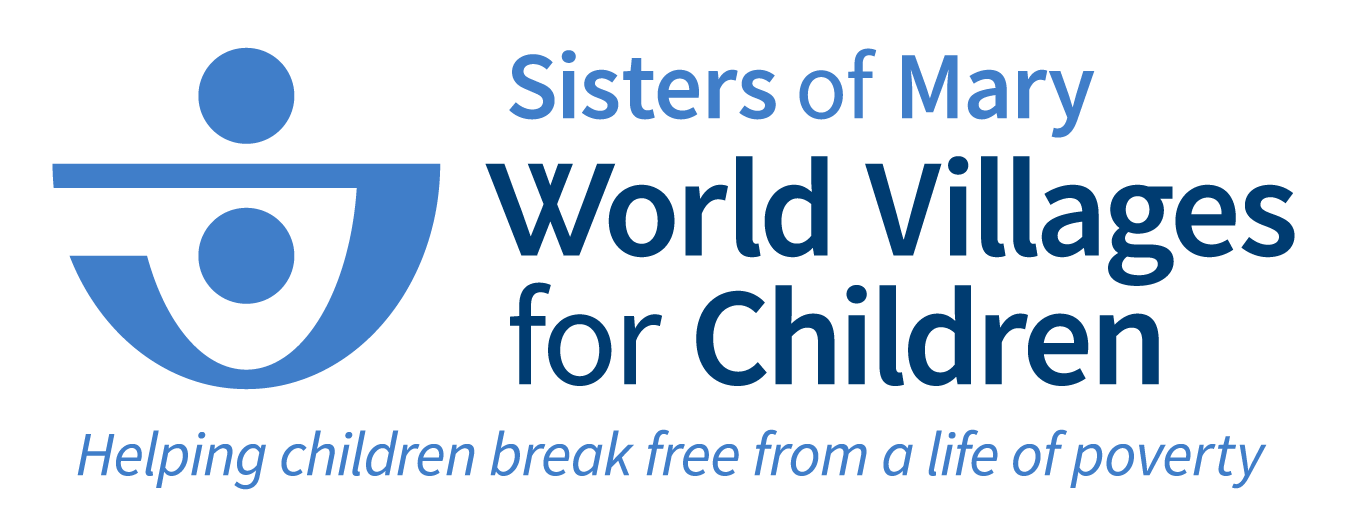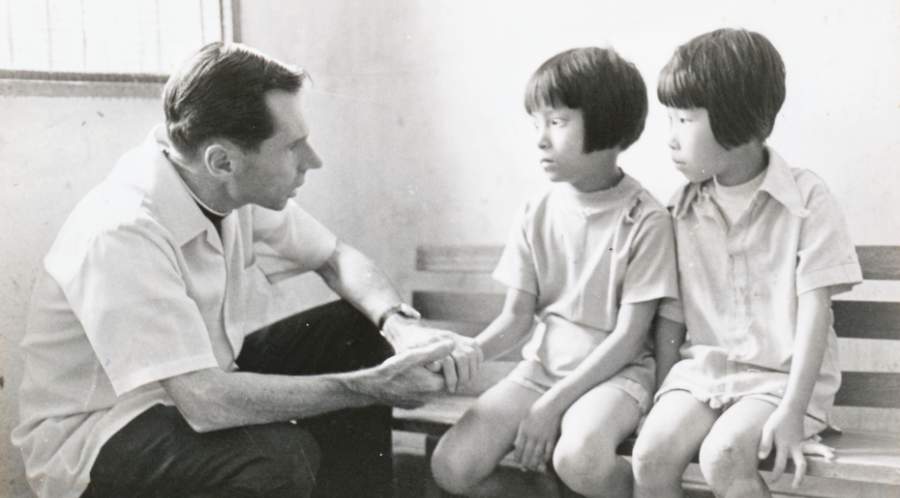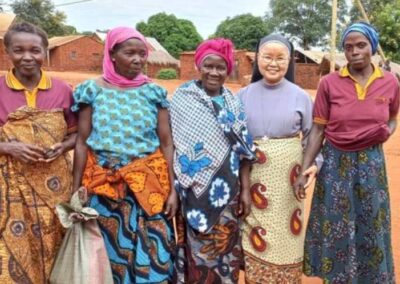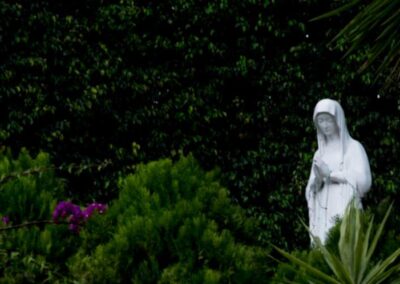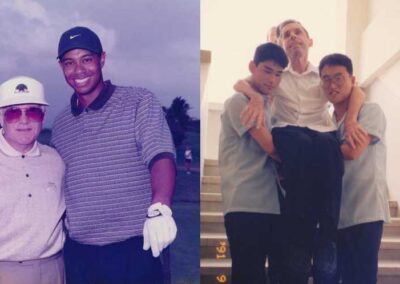Much of my May was spent in harmonious fields of resurrected joy, Mexico’s Boystown and Girlstown. Within a day or two of waving my happy goodbyes to the Sisters of Mary and their thousands of spiritual sons and daughters, graffiti, fires and sirens became the brokenhearted American soundtrack.
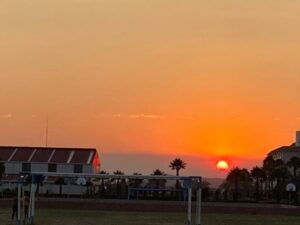
A Sunset at Chalco.
It would be impossible to untangle the dichotomy between life in America today to what I experienced in Chalco and Guadalajara for 17 days. So I’ll make it simple as I’m able: I saw light in the eyes and joy everywhere I went in Mexico. Here, it is difficult to find light and joy anywhere, at least for a sustained period.
So it has been during these forlorn American days of racial tension and disorder that Fr. Al has been heavy on my mind. Specifically, I’ve been drawn to his wisdom on Christian brotherhood – so desperately needed in this dark hour. I’ve taken his words to prayer, and they’ve been pinholes of light. His words are divine mandates.
With exploitation, anger and a relativistic zeitgeist around every bend these days – ears should bend toward heroes like Fr. Al, who saw the inherent dignity of every human life. Fr. Al saw poverty. He left everything – gave everything – to sacrifice for people who looked, spoke and lived nothing like him. He was as anti-racist as anyone ever born to woman. Accordingly, his life and words are vital during these times. All would be wise to listen to his echo.
“In a concrete manner, how do we practice brotherly love in our daily lives,” Fr. Al asked in 1991. “Well, first of all, we begin in the heart. Charity begins inside. We rid our hearts of all thoughts that are vengeful or hateful, that are jealous or that are in any way offensive against charity.”
In these days of mushrooming balkanization and an absence of brotherhood, it may seem easier to ride a bicycle to the moon than ridding our hearts of vengeful thoughts. When we pay witness to a policeman’s knee in the neck of a dying man, rioters burning private businesses or enacting violence on unsuspecting folks, our hearts naturally are torn in various directions. Love of neighbor is a Herculean task. But it is what God demands. There are no exceptions.
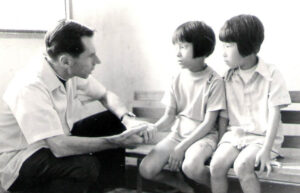
Venerable Fr. Aloysius Schwartz caring for children in South Korea.
“We do not judge. We do not find fault,” Fr. Al continued. “We do not remember the evil of others, and in a positive way, in our hearts, we try to think of the good.”
Well, it’s fair to ask – where is “the good” in any of this? The good, perhaps, would be taking this bleak time to inventory our own souls to discern where we may be lacking in charity. Emotions are roiling today, but knowing emotions signified little, Fr. Al cut right through them. He cared simply for the poverty of the conscience, soul and physical body. Rather than diagnosing emotions, he might ask of us at this moment, “Where are you shortchanging God’s will for you? Where are you straightjacketing God and your love of all humankind? Have you ever considered the concerns of those whose skin color is different from yours?”
When Fr. Al’s plane touched down on a bitterly cold December day in Korea in 1957, his eyes pulled to the poor. He never took his eyes off of them again.
Lately, I’ve been thinking of what he’d do had his plane landed in America this past week.
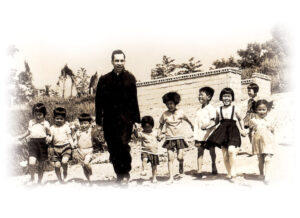
Fr. Al taking a walk with children at his South Korea program.
So for a moment, please consider what has come to me in prayer. Kindly open your mind’s eye: Fr. Al has just stepped off a plane at midnight and hailed a cab for a night’s stay in downtown Minneapolis, Washington or New York City. He pays the driver, shuts the door and instantly becomes overwhelmed by a world of the smashed-in Target and Starbucks windows and graffitied churches and historic buildings. He listens as streams of vulgarities blend with sirens and wicked laughter. Bodies rush past, one knocks him to the ground.
Fr. Al rises.
Step One: Fr. Al seeks the nearest Catholic church. Once inside, he falls prostrate in front of the Blessed Sacrament, nose and kneecaps to the inner city-church cold marble floor. He begs for the intercession of St. Teresa of Avila, Therese of Lisieux, John of the Cross, and even St. Patrick – imploring them to ask God to place his finger into a war zone.
He moves closer to the tabernacle, falls to his knees and places his trembling hand on its steel base. He is the hemorrhaging woman now, begging God for a swift remedy to the seemingly incurable bleeding unfolding just outside the church’s heavy doors.
Eventually, he moves to the statue of Our Lady to clear his head. But he tears up as he feels a sudden wave of her maternal weight. He straightens up, squares his shoulders and tenderly begins to plead with the Virgin of the Poor. His voice quivers but is resolute: Mother, lead me now. Spread your mantle as I walk into these brokenhearted streets. It’s time to become the Slaughtered Lamb. I am your Son. So Mother, ask Jesus to fortify me this dark night. It will be long and hard. Beg my Guardian Angel to strengthen me. Send Michael now.
Fr. Al leaves.
Because as always, there are souls to save.
And he’s just been equipped.
